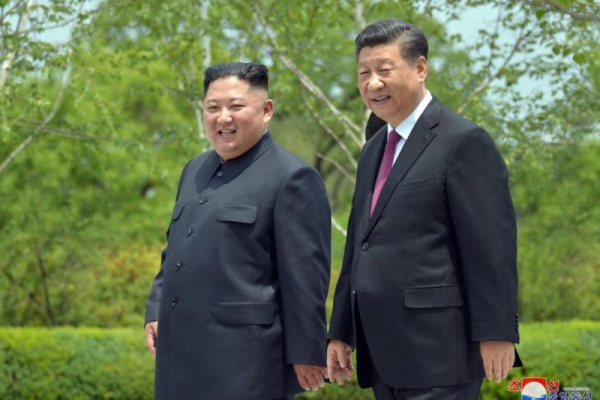The real threat on Korean Peninsula: Chinese, North Korean political warfare


North Korea’s Kim Jong-Un (L) and China’s Xi Jinping are both engaging in political warfare with South Korea. File Photo by KNCA/EPA
Amid escalating tensions between conservatives and liberals in South Korea, and as the world fixates on North Korea’s menacing nuclear arsenal, a more insidious threat is shaping the fate of the Korean Peninsula: sophisticated and largely covert political warfare orchestrated by the regimes in Beijing and Pyongyang.
While missile launches and rhetoric grab international headlines, China’s strategy of “unrestricted warfare” and the Kim family’s brand of “political warfare with Juche characteristics” are quietly undermining the Republic of Korea from within, eroding its democracy and threatening the pillars of the ROK-U.S. alliance.
Unrestricted warfare and “three warfares” in the Korean context
China’s concept of “unrestricted warfare” — popularized by the People’s Liberation Army and operationalized through the Chinese Communist Party’s United Front Work Department — goes far beyond traditional battlefield engagement.
It includes a coordinated, all-domain campaign of “three warfares,” psychological operations, legal, or lawfare, maneuvers and media/public opinion warfare. The goal of these tactics is clear: to weaken adversaries without firing a shot, minimize attribution and gain strategic dominance by sowing confusion, division and dependency in targeted societies.
In South Korea, the United Front Work Department plays a pivotal role in coordinating influence operations. The department actively seeks to suppress dissent against the Chinese Communist Party, monitor diaspora communities and foster loyalty among ethnic Chinese within South Korea.
Organizations such as the All-Korean Nationals of Chinese Descent Council mirror similar work department-aligned groups worldwide, cultivating pro-Beijing sentiment and integrating the community under CCP-friendly leadership.
Intelligence gathering, elite capture, economic coercion and technology transfer are just a few of the tactics employed to shape South Korean policy and public opinion in ways that align with Beijing’s interests.
Political warfare with Juche characteristics: North Korea’s hand
North Korea, under the Kim family regime, has long waged political warfare, guided by its own Juche ideology, as a core weapon against the South.
Pro-North Korean elements within South Korea, spanning political figures, civic organizations and clandestine networks pursue active subversion. Their efforts, sometimes lead to legal intervention, fuel political controversies and polarization, further complicating South Korea’s internal dynamics.
These activities are not theoretical concerns; they are ongoing, with direct implications for key political events such as the snap presidential election held last June. Covert assistance from Pyongyang’s United Front Department and the Reconnaissance General Bureau supports agents of influence in the South, aiming to delegitimize Seoul’s democratic institutions and fracture the U.S.-ROK security partnership.
The subtle power of covert action
One of the defining qualities of Chinese and North Korean influence operations is mastery of covert action. Their tradecraft is designed around deniability: admit nothing, deny everything, and make counteraccusations to undermine any allegations of illicit activities.
The lack of overt evidence is not proof of innocence, but rather a hallmark of skillful subversion and effective tradecraft. When credible exposés or documentaries reveal such operations, well-coordinated attacks arise, not organically, but as orchestrated disinformation campaigns intended to discredit the truth and intimidate dissenters.
The almost instantaneous, highly synchronized responses to critical media coverage of Chinese or North Korean influence operations in South Korea reveal the depth of planning and forethought — not spontaneous public backlash, but a calculated attempt to manipulate perceptions and stifle legitimate concerns.
Strategic objectives undermining democracy and the alliance
The objectives of China and North Korea are inextricably linked. Beijing views a weak or politically fractured South Korea as a strategic advantage, undermining U.S. influence in the region and shifting the balance of power in favor of Chinese interests.
Simultaneously, Pyongyang seeks to drive a wedge between Seoul and Washington, undermine the legitimacy of South Korea’s democracy and eventually end the U.S. nuclear umbrella, as well as the American military presence on the peninsula.
Both regimes benefit from mutual reinforcement: Chinese support for North Korean provocations and Pyongyang’s subversive leverage serves the broader aim of turning the Korean Peninsula into a fault line in U.S.-China strategic competition.
This shared interest sustains a persistent campaign to destabilize the South, not just through conventional threats, but by eroding the very fabric of Korean society and politics from within.
South Korea: battleground of strategic competition
The Korean Peninsula is no longer just a flashpoint for North Korean military threats or domestic political struggles; it is ground zero in the broader clash between U.S.-led democratic alliances and authoritarian great power ambitions.
Rather than simply preparing for open aggression, South Korea must recognize and counter the unseen campaigns waged daily by its northern neighbor and the world’s most powerful authoritarian state.
Ignoring or dismissing these operations as “fake news” or conspiracy theory only serves the interests of Beijing and Pyongyang. Their sophisticated political warfare is a direct assault on South Korea’s independence, democratic institutions and its alliance with the United States. Recognizing and exposing these malign activities, however subtle, covert or denied, is the first step to ensuring South Korea’s sovereignty, security and continued prosperity.
South Korea must therefore invest in robust counterintelligence, civic education and information resilience to protect its democratic system. Only by acknowledging the true nature of the threat, one that operates invisibly but with strategic intent, can the Korean Peninsula avoid being reshaped according to the designs of those who seek its division and subjugation.
David Maxwell is a retired U.S. Army Special Forces colonel who has spent more than 30 years in the Asia Pacific region. He specializes in Northeast Asian security affairs and irregular, unconventional and political warfare. He is vice president of the Center for Asia Pacific Strategy and a senior fellow at the Global Peace Foundation. After he retired, he became associate director of the Security Studies Program at Georgetown University. He is on the board of directors of the Committee for Human Rights in North Korea and the OSS Society and is the editor at large for the Small Wars Journal.